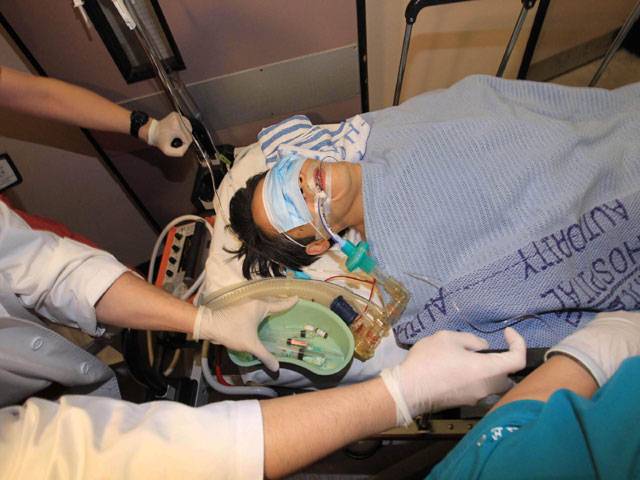HONG KONG : The former editor of a Hong Kong newspaper whose ouster triggered protests over media freedom was hacked with a cleaver Wednesday in an attack that drew condemnation from the United States and press groups.
Kevin Lau, former editor of the liberal Ming Pao newspaper, was hacked at in broad daylight by two men who escaped on a motorbike in the Chai Wan district where the newspaper’s headquarters is located, police said.
Hong Kong chief executive Leung Chun-ying described the attack as a “savage act” after visiting Lau in hospital where he underwent multiple operations. The US consulate said it was “deeply concerned about... this vicious crime” and joined calls from media groups for the authorities to bring the perpetrators to justice.
The attack comes at a time of growing unease over freedom of the press in the southern Chinese city, with mounting concerns that Beijing is seeking to tighten control over the semi-autonomous region.
Health officials said Lau underwent surgery for wounds including a 16 centimetre-long (six-inch) gash that cut through all his back muscles, and was in a serious condition but that his life was not in danger.
Tang Chung Ngai, chief of surgery at Eastern Hospital where he was being treated, said Lau was also cut on his shoulder and in four places on his legs.
Lau, who was known for hard-hitting political investigations before being reassigned as chief editor in January, was confronted by two assailants when he got out of his car.
“One of them alighted from the motorcycle and used a chopper to attack the victim,” police spokesman Simon Kwan said.
Ming Pao said on its website that it was offering a reward of HK$1 million (US$129,00) for information leading to the capture of those responsible for what its current chief editor Cheung Kin-por denounced as “cold-blooded” acts.
“We don’t want journalists in the city to work under fear in the future,” Ming Pao Staff Concern Group spokeswoman Phyllis Tsang said.
“If this situation happened, it would have a really serious impact on press freedom in Hong Kong,” she told AFP.
Plans to replace Lau with an editor from Malaysia seen as pro-Beijing prompted protests from staff who feared an attempt to stifle the paper’s investigative reporting.
Among Ming Pao’s reports have been a probe into the death of prominent Chinese dissident Li Wangyang, who was found hanged in a mainland hospital room. The official verdict was suicide but supporters believe he was murdered.
The attack on Lau is the latest in a series against journalists in the territory.
In June last year there were multiple attacks against employees of Apple Daily, a popular tabloid critical of Beijing, and Chen Ping, a publisher of a magazine known for its outspoken coverage of mainland issues, was also beaten up.
“We strongly condemn violence and urge the police to take action,” Hong Kong Journalists Association chairman Sham Yee-lan told AFP.
The Foreign Correspondents’ Club voiced shock at the incident.
“Hong Kong’s reputation as a free and international city will suffer if such crimes go unsolved and unpunished,” it said in a statement.
Critics said Lau’s sidelining was politically motivated as the city takes part in a debate about its future political system, almost 17 years after the handover from British rule, and as concerns mount that Beijing is seeking to tighten control.
Under a deal between London and Beijing, Hong Kong is guaranteed freedom of speech among other liberties that China’s mainland residents are denied.
But earlier this month two reports from international media watchdogs said self-censorship was becoming commonplace, with the Committee to Protect Journalists saying that media freedom was “at a low point”.
It cited self-censorship among reporters, financial and physical threats against the media and legislative steps that could hinder investigative reporting.
Paris-based Reporters Without Borders also said Hong Kong’s media independence was “now in jeopardy” as China flexed its muscles to stifle critical coverage.
Friday, April 19, 2024
Hong Kong editor hacked with cleaver

Caption: Hong Kong editor hacked with cleaver
8:27 AM | April 19, 2024
8:09 AM | April 19, 2024
President, PM condemn suicide blast, firing in Karachi
2:24 PM | April 19, 2024
Fly Jinnah launches another international route
2:23 PM | April 19, 2024
Interior minister directs foolproof security for Chinese nationals
2:20 PM | April 19, 2024
UNICEF to provide $20m for youth projects in Pakistan
2:04 PM | April 19, 2024
Maryam reviews progress on Nawaz Sharif IT City project in Lahore
2:04 PM | April 19, 2024
A Tense Neighbourhood
April 19, 2024
Dubai Underwater
April 19, 2024
X Debate Continues
April 19, 2024
Hepatitis Challenge
April 18, 2024
IMF Predictions
April 18, 2024
Kite tragedy
April 19, 2024
Discipline dilemma
April 19, 2024
Urgent plea
April 19, 2024
Justice denied
April 18, 2024
AI dilemmas unveiled
April 18, 2024
ePaper - Nawaiwaqt
Advertisement
Nawaiwaqt Group | Copyright © 2024





